Garages Aren't A Safe Storage Option For Your Propane Tank And Here's Why
Although garages may be convenient for storing a variety of items, one thing that should never live there is your propane tank. The dangers of gas leaks, insufficient ventilation, and the presence of potential ignition sources render the garage a highly unsafe environment for housing this gas. By following proper storage guidelines, like keeping propane tanks outdoors and away from living spaces, you can reduce the likelihood of accidents, fires, or worse.
Garages tend to be filled with various combustibles like gasoline, oil, and paint, which can quickly turn into a fire hazard when propane tanks are also involved. If a leak occurs, propane gas can accumulate within the confined space of a garage, which significantly raises the risk of accidental ignition and could potentially result in a catastrophic fire or explosion. While there are ways to tell if your propane tank is leaking, it's just not worth the risk.
How to properly store a propane tank
The safest place to store a propane tank is in a well-ventilated outdoor area, away from any potential sources of heat, ignition, or open flames (the same is true for empty tanks because they can still have residual gas in the chamber). When choosing a storage location, make sure that it's away from any electrical equipment and-or outlets, and flammables, which include oils, oil-soaked rags, and even firewood. It should also be in an area that is protected from direct sunlight and extreme temperatures.
The proper propane storage area should also be on stable ground — you might even want to consider a storage cabinet or dedicated propane tank enclosure to make sure that it stays upright in its locked position. This type of setup also adds another level of protection and security. You'll also want to make sure that the tank valve fits tightly, it's fully closed, and that there are no leaks or damage to the tank or its fittings.
Don't forget routine maintenance
You'll want to check your propane tank and do routine maintenance on a monthly basis. Before you begin running the tests, make sure that your propane tank is on level ground and that you're outside in a properly ventilated area. The tank should be able to sit upright on its own. Check the propane level by pouring hot water over the tank and looking for condensation. After that, you'll want to look for any leaks by applying soapy water to the tank and gas lines, keeping an eye out for any bubbles, which would indicate that there's gas flowing.
If you find any leaks, broken valves, corrosion, or other damage, these need to be replaced immediately. Never continue using an expired propane tank – you can check the manufacturer's expiration date on the collar of the tank. Damaged or expired tanks can usually be traded in for replacements, but you'll want to check with your local propane supplier since regulations vary from region to region.


